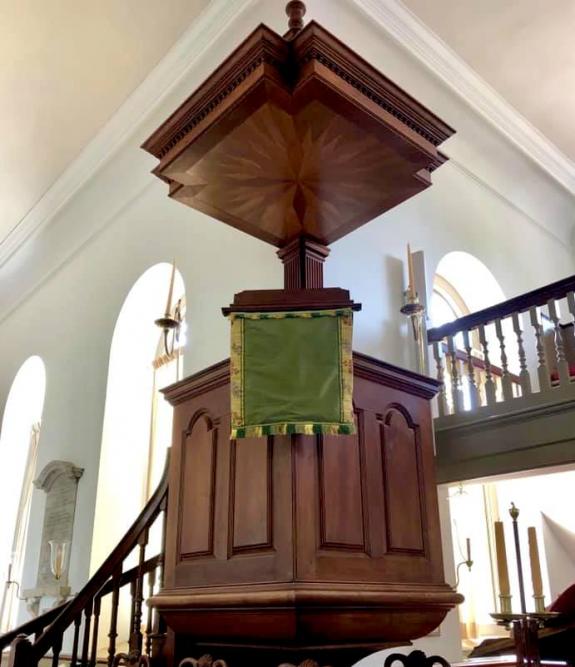It reportedly happened during Mass at Shrine of the Most Blessed Sacrament in Washington, DC. A New York Times editor reports:
Last Sunday, the diminutive priest, [Father Percival D’Silva] now 82 and officially retired, once again affirmed those basic principles and called leaders to account. In his sermon, he spoke of how the “current occupant of the White House spews hatred, bigotry and intolerance” and must resign, I learned from James Zogby, a longtime parishioner who heads the Arab American Institute, an advocacy group. (I now live in the New York area.)
“I’m compelled by Jesus Christ to say what I’m going to say. Jesus won’t let me off the hook,” the priest said, according to Mr. Zogby. Other parishioners who were there confirmed the gist of his comments.
The message, after Mr. Trump exhorted four Democratic congresswomen of color to “go back” to where they came from, was unsparing. In the most political of towns, before a congregation that includes many of Washington’s most powerful people, of all political stripes, it offered a different view of what Christ expects of his followers from that promoted by acolytes of President Trump, like Vice President Mike Pence, who assert that their evangelical Christianity is consistent with separating migrant children from their families, courting brutal dictators, seeking to bar Muslims from the country and stirring racism.
A few days earlier, hundreds of Catholic priests, nuns and lay people protested at the Capitol against conditions facing migrants at the southern border. Many protesters were led away in handcuffs.
Father D’Silva would not speak on the record about his sermon, but those at the Mass told me that he talked about how racism is a sin and referred to the Bishops’ Pastoral Letter on Racism of 1979, which called upon the church at every level to confront the evil of racism and work toward full inclusion of racial and ethnic groups. He stressed the need to “respect one another as children of God” and talked of racism as being rooted in fear — of the unknown, of losing control, of one’s inadequacies, of those who are different.
And he admonished parents about their responsibility to teach children to appreciate the differences among people, invoking the Rodgers and Hammerstein song from “South Pacific” about how “you’ve got to be taught to hate and fear” as a reference point.
Read the whole column.
Is this kosher? Well, Church law doesn’t address this particular circumstance, but it does give some guidance.
From the Code of Canon Law:
Can. 285 §1. Clerics are to refrain completely from all those things which are unbecoming to their state, according to the prescripts of particular law.
§2. Clerics are to avoid those things which, although not unbecoming, are nevertheless foreign to the clerical state.
§3. Clerics are forbidden to assume public offices which entail a participation in the exercise of civil power.
Can. 287 §1. Most especially, clerics are always to foster the peace and harmony based on justice which are to be observed among people.
§2. They are not to have an active part in political parties and in governing labor unions unless, in the judgment of competent ecclesiastical authority, the protection of the rights of the Church or the promotion of the common good requires it.
St. John Paul was more explicit. He told priests from Mexico in 1979:
You are participants in Christ’s ministerial priesthood for the service of the unity of the community. A service which is realized by virtue of the authority received to direct the People of God, to forgive sins and to offer the Eucharistic Sacrifice (cf. Lumen Gentium, 10; Presbyterorum Ordinis, 2)! A specific priestly service, which cannot be replaced in the Christian community by the common priesthood of the faithful, which is essentially different from the former (Lumen Gentium, 10)!
You are servants of the People of God, servants of faith, administrators and witnesses of Christ’s love for men; a love that is not partisan, that excludes no one, although it is addressed preferably to the poorest. In this connection, I wish to remind you of what I said not long ago to the Superiors General of the Religious in Rome: “The soul that lives in habitual contact with God and moves within the ardent ray of his love, is able to defend itself easily against the temptation of particularisms and contrasts that create the risk of painful divisions; it is able to interpret in the correct light of the Gospel the options for the poorest and for each of the victims of human selfishness, without giving way to socio-political radicalisms which are seen in the long run to be inopportune and self-defeating” (Address to the Superiors General of Men’s Religious Orders, 24 November 1978).
You are spiritual guides who endeavor to direct and improve the hearts of the faithful in order that, converted, they may live love for God and their neighbor and commit themselves to the betterment of man and to increasing his dignity.
You are priests and religious; you are not social or political leaders or officials of a temporal power. For this reason I repeat to you “Let us not be under the illusion that we are serving the Gospel if we `dilute’ our charism through an exaggerated interest in the wide field of temporal problems.” (Address to the Clergy of Rome, 9 November 1978). Let us not forget that temporal leadership can easily be a source of division, while the priest must be a sign and agent of unity and brotherhood. Secular functions are the specific field of action of laymen, who have to improve temporal matters with the Christian spirit (Apostolicam Actuositatem, 4).
As a footnote, my friend Deacon Bill Ditewig made the following observation a few years ago, in regards to deacons:
However, c. 288 specifically relieves permanent deacons (transitional deacons would still bound) of a number of the prior canons, including cc. 285 §§3 and 4, and 287 §2, “unless particular law establishes otherwise.” Particular law in this instance is provided by the National Directory on the Formation, Ministry and Life of Permanent Deacons in the United States, which states at #91: “A permanent deacon may not present his name for election to any public office or in any other general election, or accept a nomination or an appointment to public office, without the prior written permission of the diocesan bishop. A permanent deacon may not actively and publicly participate in another’s political campaign without the prior written permission of the diocesan bishop.” The diocesan bishop may also create particular law within his own diocese on such matters. In one case, a diocesan bishop notified his clergy that if anyone could even infer, through their speech, manner or demeanor, which political party or candidate the cleric was supporting, then that cleric had gone too far. While we are each entitled to form our own political decisions for ourselves, we must always be aware of the political lines we must not cross.













